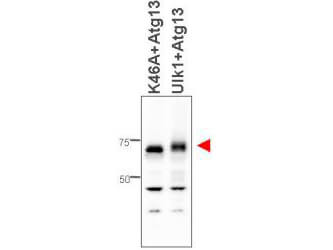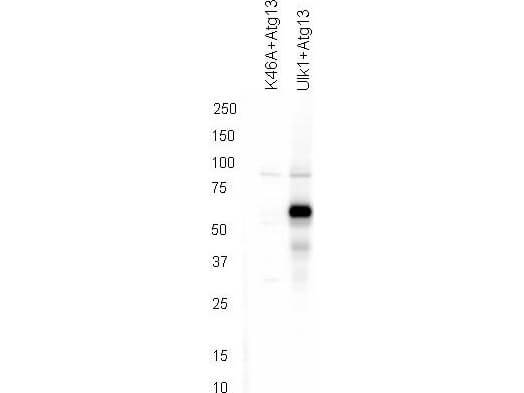Datasheet is currently unavailable. Try again or CONTACT US
ATG13 Antibody
Rabbit Polyclonal
1 References
600-401-C50S
600-401-C50
25 µL
100 µg
Liquid (sterile filtered)
Liquid (sterile filtered)
WB, ELISA
Human
Rabbit
Shipping info:
$50.00 to US & $70.00 to Canada for most products. Final costs are calculated at checkout.
Product Details
Anti-ATG13 (RABBIT) Antibody - 600-401-C50
rabbit anti-ATG13 Antibody, ATG-13, ATG 13, Autophagy-related protein 13, KIAA0652
Rabbit
Polyclonal
IgG
Target Details
ATG13 - View All ATG13 Products
Human
Conjugated Peptide
This affinity purified antibody was prepared by repeated immunizations with a synthetic peptide corresponding to the S318 region of ATG13.
This affinity-purified antibody is directed against human ATG13 protein. The product was affinity purified from monospecific antiserum by immunoaffinity purification. A BLAST analysis was used to suggest cross reactivity with ATG13 from human based on 100% sequence homology with the immunogen. Reactivity against homologues from other sources is not known.
Application Details
ELISA, WB
This affinity purified antibody has been tested for use in ELISA and by western blot. Specific conditions for reactivity should be optimized by the end user. Expect a band approximately 56.6 kDa in size corresponding to human ATG13 protein by western blotting in the appropriate stimulated tissue or cell lysate or extract.
Formulation
1.13 mg/mL by UV absorbance at 280 nm
0.02 M Potassium Phosphate, 0.15 M Sodium Chloride, pH 7.2
0.01% (w/v) Sodium Azide
None
Shipping & Handling
Dry Ice
Store vial at -20° C prior to opening. Aliquot contents and freeze at -20° C or below for extended storage. Avoid cycles of freezing and thawing. Centrifuge product if not completely clear after standing at room temperature. This product is stable for several weeks at 4° C as an undiluted liquid. Dilute only prior to immediate use.
Expiration date is one (1) year from date of receipt.
ATG13 is a target of the TOR kinase signaling pathway that regulates autophagy through the control of the phosphorylation status of ATG13 and ULK1 through their stable complex, and the regulation of ATG13-ULK1-RB1CC1. ATG13 also forms a stable complex with FIP200. Ulk1 phosphorylates ATG13 on S318 and promotes its release to damaged mitochondria. Autophagy is a normal process in eukaryotes required for turnover of cellular components during starvation and stress. It plays an essential role in cellular differentiation, cell death and aging. Defects in this evolutionarily conserved process may contribute to certain human diseases such as cancer, neurodegenerative diseases, muscular disorders and pathogen infections. ATG13 is one of several ATG genes required for autophagosome formation in mammalian cells. mTOR interacts with this complex in a nutrient dependent manner and phosphorylates Atg13 and ULK1.
Colecchia D et al. (2018). MAPK15 is part of the ULK complex and controls its activity to regulate early phases of the autophagic process. J Biol Chem.
Applications
WB, IB, PCA
This product is for research use only and is not intended for therapeutic or diagnostic applications. Please contact a technical service representative for more information. All products of animal origin manufactured by Rockland Immunochemicals are derived from starting materials of North American origin. Collection was performed in United States Department of Agriculture (USDA) inspected facilities and all materials have been inspected and certified to be free of disease and suitable for exportation. All properties listed are typical characteristics and are not specifications. All suggestions and data are offered in good faith but without guarantee as conditions and methods of use of our products are beyond our control. All claims must be made within 30 days following the date of delivery. The prospective user must determine the suitability of our materials before adopting them on a commercial scale. Suggested uses of our products are not recommendations to use our products in violation of any patent or as a license under any patent of Rockland Immunochemicals, Inc. If you require a commercial license to use this material and do not have one, then return this material, unopened to: Rockland Inc., P.O. BOX 5199, Limerick, Pennsylvania, USA.


